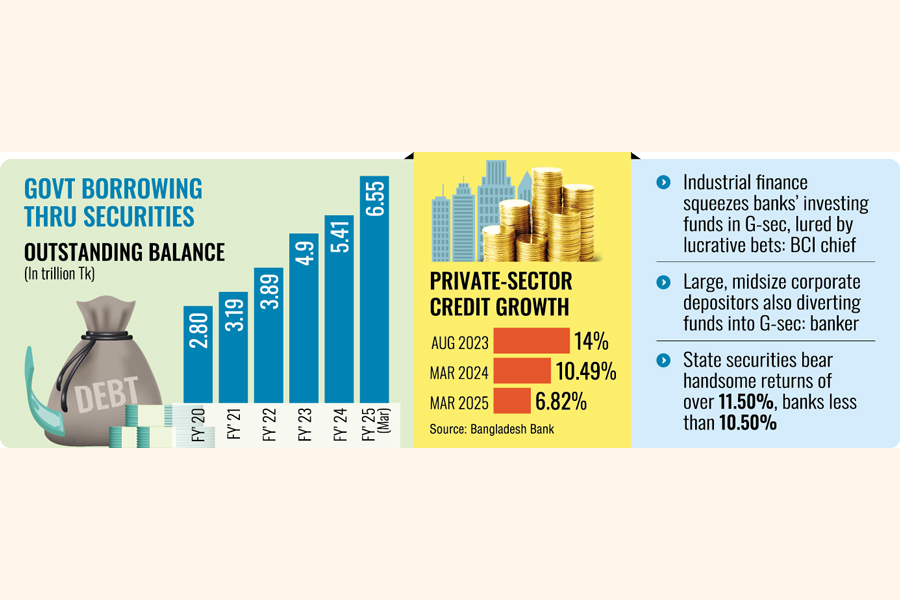Govt securities turn hotcakes for institutional investors
G-sec market expands by Tk 1.15tn in nine months

Published :
Updated :

Government securities turn hotcakes as the G-sec market booms on the back of a quick growth in borrowing with these instruments by Tk 1.15 trillion in the first nine months of this fiscal.
Officials and money-market analysts have said the government borrowing from the financial sector through issuing securities keeps rising because of growing budget-financing shortfalls for less-than- expected level of revenue incomes.
But growing government dependence on bank borrowing to make up for budget deficits further heightened the existing liquidity pressure on commercial banks. As a matter of fact, the scope of getting formal credits from the banking system for the private sector is squeezing.
The debt securities market is vital to an economy's development. This market offers solid opportunities for long-term financing by providing an alternative source of capital as well as a secured source of income for investors. Since the corporate bond market has yet to mature, government securities market dominates the fixed-income securities market.
According to statistics available with the central bank, the outstanding balance of government securities stood at Tk 6.55 trillion at the end of March 2025 from Tk 5.41 trillion recorded in FY'24.
The outstanding balance of government securities in previous four fiscal years (FY'23, FY'22, FY'21 and FY'20) was Tk 4.90 trillion, Tk 3.89 trillion, Tk 3.19 trillion and Tk 2.80 trillion respectively.
Seeking anonymity, a Bangladesh Bank official said government's domestic borrowing is on the upturn significantly because of widening budget-financing deficit for not getting expected level of revenues.
On the other hand, the central banker said, the government has issued special bonds since January last year for settling accumulated arrears to independent power producers and fertiliser suppliers that also contributes to the debt rise.
"I think it (the volume of government securities) will continue growing unless the revenue-mobilisation target is reached," the official told the FE.
According to the BB, commercial banks have so far received special bonds worth around Tk 150 billion since September of this fiscal, which is around 15 per cent of the piled-up government securities in this fiscal.
Bangladesh Chamber of Industries (BCI) president Anwarul Alam Chowdhury Parvez notes that the cost of formal credits continues to rise while the industries face difficulties in operating full scale of production because of energy crisis in the industrial hubs.
Simultaneously, he says, the commercial lenders have largely been making their investment in government securities getting lured by higher yields instead of their regular lending activities.
"And it may squeeze the scope of getting credits by the private sector. Look at the data of private-sector credit growth, it is plummeting continuously," the chamber chief says about the financing dilemma.
The private-sector credit growth dropped to 6.82 per cent in March from last year's March count of 10.49 per cent. The growth was over 14 per cent in August 2023, the central bank data showed.
Managing director and chief executive officer of Mutual Trust Bank (MTB) PLC Syed Mahbubur Rahman says as the credit demand from the banking sector is on the downturn, the liquidity stress is not visible yet.
"Not only the banks, large and medium corporate depositors have now been diverting their funds into state securities to get handsome returns of over 11.50 per cent in short terms whereas most banks are offering less than 10.50 per cent," he adds.
The experienced banker feels the government's high dependence on the banks will continue unless the tax-GDP ratio is not expanded to the expected level.
Of the outstanding balance in G-sec, banks hold nearly 69-percent share while nonbanks, institutional and individual investors account for the remaining portion of debt securities market, according to the data.
jubairfe1980@gmail.com


 For all latest news, follow The Financial Express Google News channel.
For all latest news, follow The Financial Express Google News channel.